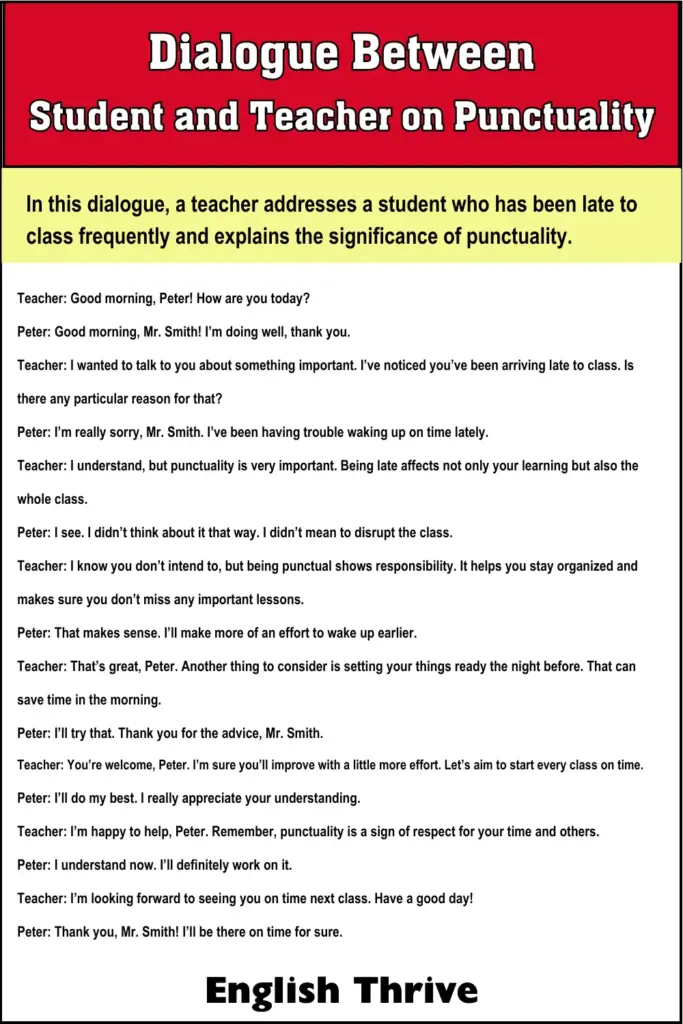Punctuality is an important value that shapes students’ behavior and attitudes in both academic and personal life. In these dialogues, a student and teacher have conversations about the importance of being punctual. Each dialogue offers different situations while keeping the language simple and polite.
Contents
ToggleSample 1: Dialogue Between Student and Teacher on Punctuality
Context:
In this dialogue, a teacher addresses a student who has been late to class frequently and explains the significance of punctuality.
Teacher: Good morning, Peter! How are you today?
Peter: Good morning, Mr. Smith! I’m doing well, thank you.
Teacher: I wanted to talk to you about something important. I’ve noticed you’ve been arriving late to class. Is there any particular reason for that?
Peter: I’m really sorry, Mr. Smith. I’ve been having trouble waking up on time lately.
Teacher: I understand, but punctuality is very important. Being late affects not only your learning but also the whole class.
Peter: I see. I didn’t think about it that way. I didn’t mean to disrupt the class.
Teacher: I know you don’t intend to, but being punctual shows responsibility. It helps you stay organized and makes sure you don’t miss any important lessons.
Peter: That makes sense. I’ll make more of an effort to wake up earlier.
Teacher: That’s great, Peter. Another thing to consider is setting your things ready the night before. That can save time in the morning.
Peter: I’ll try that. Thank you for the advice, Mr. Smith.
Teacher: You’re welcome, Peter. I’m sure you’ll improve with a little more effort. Let’s aim to start every class on time.
Peter: I’ll do my best. I really appreciate your understanding.
Teacher: I’m happy to help, Peter. Remember, punctuality is a sign of respect for your time and others.
Peter: I understand now. I’ll definitely work on it.
Teacher: I’m looking forward to seeing you on time next class. Have a good day!
Peter: Thank you, Mr. Smith! I’ll be there on time for sure.

Sample 2: Dialogue Between Student and Teacher on Punctuality
Context:
In this dialogue, a teacher praises a student for being punctual and explains the positive effects of punctuality.
Teacher: Hi, Alice! How’s everything going?
Alice: Hi, Mrs. Brown! Everything is going well, thank you!
Teacher: I wanted to talk to you for a moment. I’ve noticed you’ve been coming to class on time every day. That’s great!
Alice: Thank you, Mrs. Brown. I think it’s really important to be on time for class.
Teacher: Absolutely! Punctuality is not only important for your studies, but it also shows that you value your time and others’ time.
Alice: Yes, I agree. It helps me get settled in and ready to learn without feeling rushed.
Teacher: That’s a great attitude. When you arrive on time, you don’t miss any important instructions or announcements.
Alice: I’ve also noticed that being on time helps me focus better during the lesson.
Teacher: Exactly! It allows you to be more organized and prepared. Punctual students often perform better in exams too.
Alice: That’s a good point. I feel more confident in class when I’m on time.
Teacher: I’m glad to hear that. Keep up the good work, Alice. Your punctuality is a great example to others.
Alice: I’ll continue being on time, Mrs. Brown. Thank you for noticing!
Teacher: It’s my pleasure. Keep it up! Being punctual will help you in all aspects of life.
Alice: I’m sure it will. Thanks for the encouragement!
Teacher: You’re welcome, Alice. Have a wonderful day ahead!
Alice: You too, Mrs. Brown!
Sample 3: Dialogue Between Student and Teacher on Punctuality
Context:
This dialogue highlights a situation where a teacher is explaining how punctuality helps with time management.
Teacher: Good morning, Mark! How are you today?
Mark: Good morning, Ms. Adams! I’m doing fine, thank you!
Teacher: I wanted to discuss something with you. I’ve noticed that you’ve been arriving late for class lately. Is everything okay?
Mark: I’m sorry, Ms. Adams. I’ve been struggling with managing my time in the mornings.
Teacher: Time management is a skill that can make a big difference in your life, Mark. Being punctual is a good way to practice it.
Mark: I see. So, if I improve my time management, I’ll be on time for class?
Teacher: Exactly! Setting a clear routine in the morning can help. Try waking up 15 minutes earlier or organizing your things the night before.
Mark: That sounds like a good idea. I’ll try adjusting my routine.
Teacher: Great! Punctuality not only helps you stay organized but also teaches you discipline, which is important for your future.
Mark: I hadn’t thought about it that way. I’ll make sure to plan my mornings better.
Teacher: That’s the right attitude, Mark. The key is to be consistent. The more you practice punctuality, the easier it will become.
Mark: Thanks, Ms. Adams. I’ll definitely work on it.
Teacher: I believe you will. It will make a huge difference in your performance. Keep it up!
Mark: I’ll do my best! Thanks for the advice!
Teacher: You’re welcome, Mark. I’m looking forward to seeing you on time for the next class!
Mark: You’ll see me there for sure!
Sample 4: Dialogue Between Student and Teacher on Punctuality
Context:
This dialogue shows a teacher explaining how punctuality can build a good reputation for a student.
Teacher: Hello, Sarah! How are you today?
Sarah: Hi, Mr. Walker! I’m good, thank you!
Teacher: I wanted to talk to you about your punctuality. I’ve noticed you’ve been late to class a few times this week.
Sarah: I’m really sorry, Mr. Walker. I’ve been having some trouble with my schedule lately.
Teacher: I understand, but being punctual is important. It helps you build a good reputation. When you are on time, others will notice your dedication.
Sarah: I see. I hadn’t thought of it that way.
Teacher: Being on time shows that you respect both your time and the time of others. It also helps you stay organized.
Sarah: That’s true. I’ll try harder to manage my time better.
Teacher: Great! Punctuality can also make you more confident. You feel prepared and ready to learn when you’re on time.
Sarah: I’ll start planning ahead more. I want to improve my time management skills.
Teacher: That’s the right attitude! With some practice, you’ll become more efficient in both school and other parts of life.
Sarah: Thanks for the advice, Mr. Walker. I’ll work on being more punctual.
Teacher: You’re welcome, Sarah. I’m sure you’ll improve quickly. Keep up the good work!
Sarah: I’ll do my best. Thanks again!
Sample 5: Dialogue Between Student and Teacher on Punctuality
Context:
This dialogue features a teacher reminding a student about the importance of punctuality before exams.
Teacher: Good morning, John! How are you today?
John: Good morning, Mrs. Taylor! I’m doing well, thank you!
Teacher: I wanted to remind you about something important. With exams coming up, it’s crucial to be punctual to every class.
John: I understand, Mrs. Taylor. I’ve been a bit late lately because of some personal issues.
Teacher: I know life can get busy, but being on time will give you the best chance to prepare properly for exams.
John: I see. I didn’t realize how important it was, especially now.
Teacher: Yes, arriving on time gives you time to settle in, review notes, and be mentally prepared. You won’t miss out on important information.
John: That makes sense. I’ll make sure to be on time from now on.
Teacher: I’m glad to hear that, John. Punctuality is essential not just for exams, but for your overall success in life.
John: I’ll keep that in mind, Mrs. Taylor. Thanks for the reminder.
Teacher: You’re welcome, John. I know you’ll do your best. Good luck with your studies!
John: Thank you, Mrs. Taylor! I’ll be there on time for every class!

FAQs About Dialogue Between Student and Teacher on Punctuality
1. How to write a dialogue between teacher and student?
To write a dialogue between a teacher and student, follow these steps:
- Introduce the characters: Mention the names and roles.
- Set the scene: Briefly explain the context.
- Use simple and polite language: Make the conversation natural and clear.
- Alternate dialogue: Give each speaker their own paragraph, starting with the speaker’s name followed by a colon.
2. What is the dialogue between Vasu and his teacher on his coming late?
Teacher: Vasu, I noticed you’ve been late to class a few times. Is there a reason?
Vasu: I’m sorry, Mr. Sharma. I had some trouble with my bus schedule.
Teacher: Punctuality is important, Vasu. It helps you stay on track with lessons. Can you try leaving earlier next time?
Vasu: I’ll make sure to leave earlier, Mr. Sharma. I’ll work on it.
Teacher: Thank you, Vasu. Being on time shows respect for everyone’s time.
3. What is the dialogue between two friends about the importance of time?
Friend 1: I think I’m always running late. It’s stressing me out.
Friend 2: You should try to be more punctual. Time management helps reduce stress and makes you feel more in control.
Friend 1: You’re right. I need to plan better and stick to a routine.
Friend 2: Exactly! Being on time shows respect for others and helps you stay focused on your tasks..

